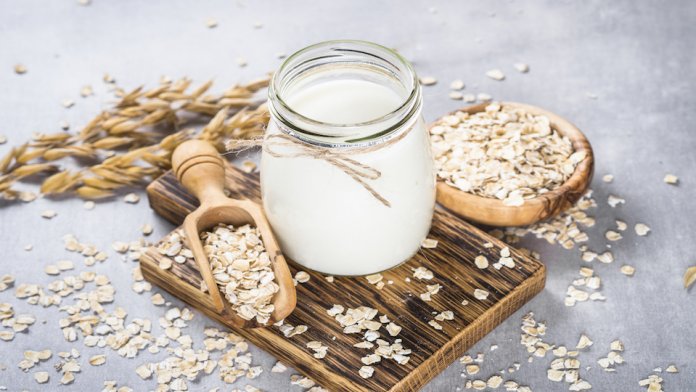There was a time not too long ago when “non-dairy creamer” in those little plastic cups was the only milk alternative there was. (Interestingly, many of those coffee creamer products actually contain ingredients derived from milk!) Today though, store shelves are brimming with milk alternatives, many of which are great choices for people who are unwilling or unable to consume cows milk. One of the most underappreciated options is oat milk…which is loaded with health benefits and easy to make at home. This article from my team at UpWellness will shine some light on oat milk for you.
Enjoy.
-JL
You may have noticed that plant-based alternatives to dairy milk have become quite popular lately. Oat milk is one of these dairy alternatives that is especially beneficial for those who are intolerant or have allergies. Oat milk contains zero lactose, zero soy, and zero nuts. It can also be made totally gluten-free if made with gluten-free oats.
Oat milk is loaded with nutrients
Oat milk is loaded with health-promoting fiber and the following nutrients.
- Vitamin B12
- Riboflavin
- Calcium
- Phosphorus
- Vitamin D
- Vitamin A
- Potassium
- Iron
Amazing health benefits of oat milk
Not only does oat milk contain a plethora of nutrients and taste delicious, but it has numerous health benefits. Let’s explore some of these benefits now.
Oat milk may lower blood cholesterol
Oat milk contains beta-glucans which is a soluble fiber that is great for your heart. Once beta-glucans reach your gut they form a gel-like substance which easily binds to cholesterol and reduces its absorption. One cup of oat milk contains about 1.3 grams of beta-glucans. This helps reduce blood cholesterol levels and more importantly levels of LDL cholesterol which are linked to heart disease.
In one study, men who drank 3 cups of oat milk daily for five weeks had a 3% reduction in total blood cholesterol and a 5% reduction of LDL cholesterol.
In another study, it was found that consuming 3 grams of oat beta-glucans daily lowered LDL cholesterol by 5-7%.
Oat milk can improve bone health
Because oat milk is generally fortified with vitamin D and calcium, it can help improve bone strength. Calcium is the primary mineral used to form strong and healthy bones and a lack of it in your diet may result in bones becoming hollow and more prone to fracture.
Having enough vitamin D is necessary for the absorption of calcium from the digestive tract. If you do not have enough vitamin D, it can reduce the amount of calcium that you get which also increases weakening and the risk of fractures.
Oat milk purchased in the store is a good source of vitamin B12 which is linked to healthy bones and a decreased risk of osteoporosis.
Making your own oat milk
If you don’t want to purchase commercial oat milk, you can easily make it at home. Making your own oat milk allows you to have control over the ingredients and avoid any additive or thickeners that may be added to commercial brands. In addition, you can make it 100% gluten-free by using gluten-free oats. The one downside to homemade oat milk is that it won’t necessarily contain the added vitamins that commercial products do.
To make oat milk, simply blend one cup of rolled or steel cut oats with three cups of filtered water. Pour the mixture over a cheesecloth to strain out the milk. Store in a glass bottle for up to five days in the fridge. If you want to enhance the flavor, add ¼ teaspoon of sea salt and a teaspoon of vanilla or cinnamon extract. You can also add a little raw honey or a few dates to lightly sweeten the milk.
Cautions when using commercial oat milk
If you choose to purchase your oat milk from the store, beware of brands that contain an excessive amount of added sugar. Stay clear of flavored varieties to avoid high sugar. While oat milk is safe for babies and children, it is not a suitable alternative to breast milk or cow’s milk because it lacks necessary nutrients.
-The UpWellness Team


